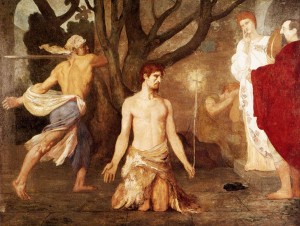When men pretend to favor the gospel, yet live in evil, we must not favor their self-delusion, but must deliver our consciences as John did. The world may call this rudeness and blind zeal. False professors, or timid Christians, may censure it as want of civility; but the most powerful enemies can go no further than the Lord sees good to permit. – Matthew Henry’s Commentary on Matthew 14:1
Would John the Baptist be welcome in today’s Church? In the first place, his way of life was so ascetical that he would surely trouble a lot of consciences, even in the hierarchy. And then there was his preaching, which included a public condemnation of Herod Antipas for living in incest with his half-brother Philip’s wife. That would bring a lot of criticism, if not outright censure today.
John’s mission was basically twofold. He was the final prophet who would announce the Messiah’s presence. But first he was to prepare the people of Israel to receive the Messiah, who was already in their midst, by his firm call to repentance for sin. This latter part of his mission was to a whole nation, and it was rather indeterminate as to the sins themselves, until he confronted Herod. Then things got personal.
Herod was in fact part of Israel, its ruler, appointed by the Roman Emperor. But a partially committed member of the Jewish religion. He wasn’t devout, by any means, and was rather eclectic. He was evidently committed to some Jewish practices or customs, but he obviously was not really much of a believer in doctrines.
Like his father, Herod the Great, he was not keen on the belief in a Messiah. We know nothing of his other beliefs, if he had any. But we do know he was despised by all the religious factions who had to deal with him. We also know from historians that he tinkered with pagan customs related to the gods of his masters, the Romans. When it was politically opportune, he would do whatever was required religiously, either for the Jews or pagans.
But John treated him as a fellow Jew not a pagan. And John paid him respect by calling him to repent and reform his life, like other Jews. Moreover, because Herod was a part of Israel, regardless of his tepidity, and because Herod held a very important office before the people, John could not allow his scandalous behavior (his incestuous union with Herodias) to go unchecked. So he called Herod out, and it cost him his life.
It’s hard to imagine this drama taking place today. Herod resembles a lot of Catholic politicians today who practice their religion only in accord with whatever is advantageous to their political ambitions. How may Catholic politicians today pay tribute to the contemporary gods of the pagans? How many “Catholics” in Congress and other legislatures and governorships support the “sacraments” sacred to the secular religion; the sacrament of abortion for decades now, and soon the sacrament of homosexual “marriage?”

There simply are no John the Baptists among the leaders of our Church today, who, by their very offices, have received a prophetic role from Christ. What Catholic politician who openly works against the moral teachings of Christ has been called out publicly? I know of only one in the last fifty-three years, when Archbishop Joseph Rummel of New Orleans excommunicated Democrat boss Leander Perez in 1962 for his racist rejection of the integration of schools.
Since then, there has not been one, I am fairly certain. So I guess these modern political betrayals, contributing to mass murder and the perversion of marriage, do not merit even a public reprimand, let along excommunication.
But, are we perhaps to believe that bishops are reprimanding these Catholic religious quislings in private? That was the frequent claim that effectively silenced the pleas of parents whose children were abused by clergy, “the bishop is handling this quietly to avoid scandal.” But that turned out rarely to be the case.
Moreover, quiet dialogue can never be an adequate response when there is the situation of grave public scandal. St. John knew he could not just speak with Herod privately because Herod was a public scandal. Archbishop Rummel knew it was not enough to speak to Perez secretly, though he did in fact do that, because Perez was unbending in his scandalous behavior.
Today’s semi-catholic politicians are likewise obstinate in their scandal. Regardless of whether bishops have spoken to them privately, calling them to repentance, it has not worked. And the public scandal continues, and more and more laity are genuinely confused.
It is not enough for Church leaders simply to dialogue or “speak with” such politicians. These politicians’ actions call for repentance, and their repentance has to be public in nature to remove the public scandal.
While still a Cardinal, Pope Benedict stated that a primary duty of the bishop is to protect the faith of the simple Catholic faithful. When Catholic politicians promote grave evils in society by their actions, they clearly cause grave scandal among the faithful. How many ordinary Catholics over the past few decades have understandably concluded, observing their leaders’ actions, that anyone can be a faithful Catholic and still support abortion in the public square and even in one’s private life?
They not only never see the contemporary “Herods” reprimanded by the contemporary guardians of the faith, but they even see them receiving Communion from their leaders. What are many likely to conclude?
Leander Perez returned to the Church before he died, which meant that he had to reject and repent of his racism. Had his archbishop let him go with a quiet reprimand, one wonders if that repentance, necessary for salvation, would have occurred? I like to think that Perez will be eternally grateful to his old enemy, and that they now enjoy beatitude together, like Paul and Stephen.
















